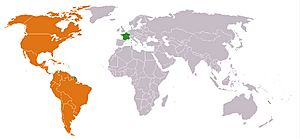Jean Cousin (navigator) facts for kids

Jean Cousin, also known as Jehan Cousin, was a French sailor from the 1400s. He came from a region in France called Normandy. Some people believe he discovered the New World (the Americas) in 1488. This was four years before Christopher Columbus arrived! It's said that Cousin landed in Brazil, near the mouth of the Amazon River.
One of Cousin's captains was named Alonzo Pinzón. After their trip, Pinzón reportedly left Cousin after an argument. It is claimed that Pinzón then went to Spain and shared his knowledge with Christopher Columbus, helping him plan his famous westward journey. Pinzón was known for being very confident in guiding Columbus to the New World. However, there are no clear written records that fully prove Jean Cousin's claim of discovery.
Early Explorations
After Jean Cousin's possible journey, another French explorer named Binot Paulmier de Gonneville sailed in 1504. He traveled on a ship called L'Espoir (meaning 'Hope'). Gonneville's trip was properly recorded. He even brought an Indigenous person named Essomericq back to France.
When Gonneville visited Brazil, he said that French traders were already there. These traders were from the French cities of Saint-Malo and Dieppe. They had been trading in Brazil for several years before Gonneville arrived. This suggests that French sailors might have been exploring the area for a while.
French Claims to the New World
The story of Jean Cousin and his sailors from Normandy was used later by King Charles IX of France. In 1564-1565, France tried to set up a colony in Florida called Fort Caroline. King Charles IX used Cousin's story to say that the French had discovered the New World before the Spanish. This helped justify France's attempts to claim land there. The French even called this area "Terre des Bretons" (Land of the Bretons).
The idea that Jean Cousin discovered the New World has been supported in France for a long time. In 1660, a writer named Estienne Cleirac wrote about it in his book Us et coustumes de la mer. Even today, this claim sometimes appears in popular books and stories.
See also
 In Spanish: Jean Cousin (navegante) para niños
In Spanish: Jean Cousin (navegante) para niños
 | Kyle Baker |
 | Joseph Yoakum |
 | Laura Wheeler Waring |
 | Henry Ossawa Tanner |

